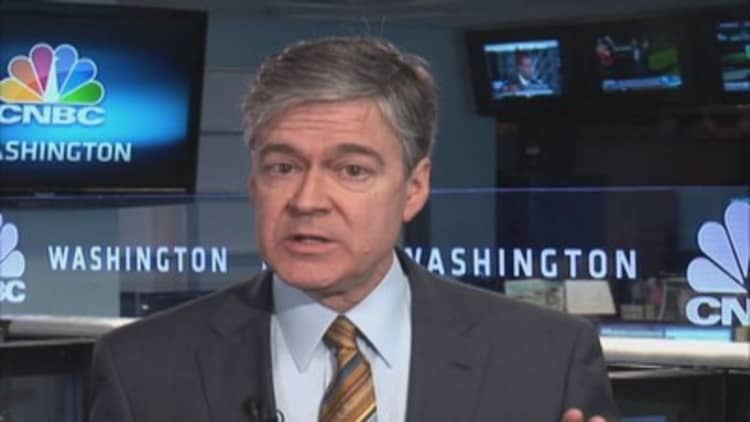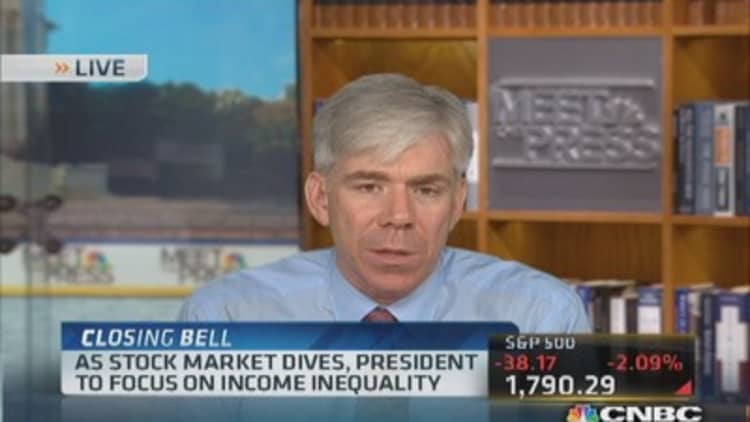
When he stands before lawmakers Tuesday night for his State of the Union speech, President Barack Obama will have a message for the divided Congress that has largely stymied his agenda for the past three years: Fine, I'll go it alone.
"I've got a pen," Obama has said in the weeks leading up to the speech, "and I can use that pen to sign executive orders and take executive actions and administrative actions that move the ball forward."
Many of Obama's big policy goals have ended up stranded in limbo between the Democratic-controlled Senate trying to advance his agenda and the Republican-led House bent on stopping him.
And, heading into a midterm election year, he faces lame-duck status unless his party can regain control of the House this November.
Frustrated with the Capitol Hill quagmire, the president is increasingly turning toward the power of the presidency to try to solidify his legacy. Obama has pledged to act, saying, "We are not just going to be waiting for legislation in order to make sure that we're providing Americans the kind of help that they need."
More from NBC News:
Treasury Secretary sounds alarm on new debt ceiling deadline
Paul says cooperation possible with Obama on 2014 policy agenda
Arizona GOP censures John McCain for 'liberal' voting record
"The president sees this as a year of action, to work with Congress where he can and to bypass Congress where necessary," White House press secretary Jay Carney told ABC News Sunday.
This rhetoric is not new for Obama. He said last June that climate change is "a challenge that does not pause for partisan gridlock. It demands our attention now."
The president has also warned that he "has a phone," to rally the county around his ideas and entice businesses and non-profit organizations to help shift the political winds.
Here are three areas where President Obama can act on his own or at least can operate with a great degree of leeway
Appointments
Now that Senate Democrats have eliminated filibusters for nominations other than to the Supreme Court, the way is clear for Obama to fill vacancies in executive branch agencies and especially to life-tenured posts on the federal appeals courts.
Nominees can now be confirmed by a simple majority vote. Democrats have 55 votes in the Senate, which allows Democrats in conservative states or who face tough re-election races in 2014 to not vote with Obama on his contentious nominees.
Last month, three red-state Democrats, including Sen. Mark Pryor of Arkansas who's up for re-election this fall, voted against Obama appeals court nominee Nina Pillard, who'd made controversial comments critical of anti-abortion protesters.
There are now 16 vacancies on the federal appeals courts around the country. So far Obama has sent nine nominees to the Senate for these open posts.
Thanks to the abolition of the filibuster in the case of most nominees, Democratic-appointed judges now dominate the Court of Appeals for the District of Columbia Circuit which handles many EPA and other regulatory cases. Obama and Bill Clinton have appointed seven of that court's 11 active judges.
(Read more: 2014 State of the Union: 6 things to expect during Obama's speech)
Executive orders and directive
Based on what Obama and his aides have said in the run-up to the State of the Union, it's likely that he will seek to test the limits of what he can do through executive orders and directives to federal agencies.
Kentucky Sen. Rand Paul discusses cooperation between political parties.
An example of one Obama directive done by presidential memorandum: last June he directed the Interior Department to approve enough renewable energy capacity on federal lands to power more than 6 million homes by 2020.

But congressional Republicans are on a high state of alert for what they see as Obama intrusions on congressional law-making power.
Sen. Rand Paul, R-Ky., warned Sunday that "when the executive branch tries to assume the legislative powers, that that's a form of tyranny."
And in testimony to the House Judiciary Committee last month, Georgetown University law professor Nicholas Quinn Rosenkranz, who served in the Justice Department during the Bush administration, criticized "the president's decision to enforce the immigration laws as though the DREAM Act had been enacted when in fact, it has not."
He said that even though Obama favors the DREAM Act, "Congress repeatedly declined to pass it. So the president simply announced that he would enforce the Immigration Nationality Act as though the DREAM Act had been enacted."
(Read more: Obama's risk of going too left in State of the Union)
Regulations
The coming year will be crucial for the climate change agenda which Obama announced last June.
Amy Mall, a senior policy analyst at the Natural Resources Defense Council (NRDC), an environmental advocacy group, told reporters last month the Bureau of Land Management (BLM) has been developing new rules for fracking—hydraulic fracturing to increase natural gas and oil output—under federal leases for areas that "serve as major sources of drinking water for metropolitan areas like Washington, D.C. and the Denver metro area."
The NRDC, she said, thinks BLM's fracking policy "is much too weak," so environmentalists will be closely watching Obama's nominee to head the BLM, Neil Kornze, who is a former advisor to Senate Majority Leader Harry Reid.
The BLM may not be well known to most Americans, even though it administers 245 million acres, an area larger than New York, Florida, Minnesota and California combined. And Kornze, who is awaiting Senate confirmation, isn't a household name. But the decisions that he and other regulators make will have enormous real-world consequences, even though the debate over these policies won't usually be taking place on the Senate floor and certainly won't be broadcast in primetime as will Obama's speech Tuesday night.
—By Tom Curry of NBC News

